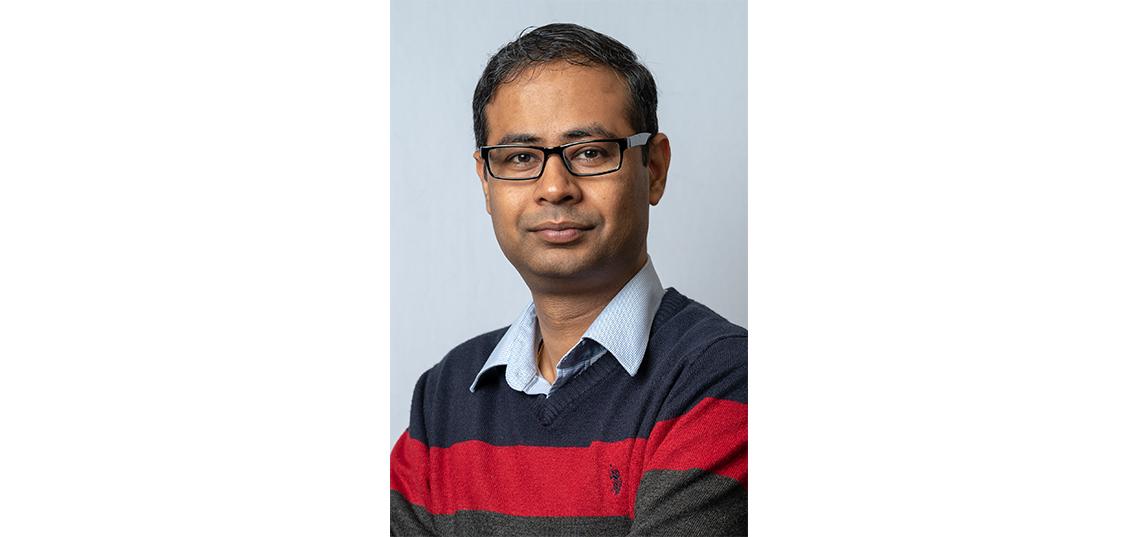
The National Science Foundation (NSF) has awarded Assistant Professor of Library and Information Science Vivek Singh funding for two research projects related to COVID-19. The first project, “RAPID: Countering Language Biases in COVID-19 Search Auto-Completes" will examine the equitable sharing of pandemic-related information across multiple languages (e.g., English, Spanish). The second project, “RAPID: Privacy-Preserving Crowdsensing of COVID-19 and its Sociological and Epidemiological Implications," will focus on privacy-aware development of coronavirus symptom trackers. Both grants will run from May 1, 2020 - April 30, 2021.
On the first project, Singh will serve as the principal investigator whose role will be to audit COVID-19 related search autocompletes in English and Spanish and identify differences (if any). He will also make recommendations for equitable health information dissemination. He will collaborate on this project with Assistant Professor Pamela Valera in the Rutgers School of Public Health.
The researchers will examine “autocomplete” results, a search engine feature that allows users to complete searches faster by populating information in the search engine’s text box as they type. The feature, while convenient, can contribute to bias that, if left unchecked has the potential to lead to health disparities experienced by marginalized and minority groups by providing different results for similar inquiries.
Singh said that “preliminary investigation, which led to this project, showed that the auto-completes for terms related to COVID-19 were quite different in English and Spanish. For instance, in the first three auto-complete results for "coronavirus is ...," the English version had one question and two neutral-sounding statements. For the Spanish version "coronavirus es ..." all of the top auto-completes were unfavorable. We found similar differences in multiple COVID-19 related terms and hence we want to study these differences systematically over time.”
This investigation is timely, they explained, because the global coronavirus pandemic has resulted in sharp increases in online search activity about the disease, its spread, and remedial actions. Hence, search engines can significantly influence public perception of the disease and the actions undertaken by the public.
Their research will also help ensure equity in health information dissemination and generate new knowledge exploring the emergence of algorithmic bias at scale amid large-scale health emergencies. “By examining autocompletes in search engines, we can understand how bias and misinformation contribute to exacerbating health inequalities,” Valera said.
They will distribute their findings in accessible, easy-to-understand terms on an urgent basis in English and Spanish, as scientific articles, Medium articles, and popular media reports, to lay-persons, health information professionals, search engine companies, and research communities. “This could help directly improve the health outcomes for numerous individuals”, Singh said. At the start of their research they will focus only on English and Spanish, but they plan to include other languages in the future.
On the second project, Singh's collaborators are Professor Jaideep Vaidya (principal investigator) and Associate Professor Periklis Papakonstantinou (co-principal investigator), both faculty members at the Rutgers Business School Newark and New Brunswick, and Stephanie Shiau (co-principal investigator), an instructor in the Department of Biostatistics and Epidemiology at the Rutgers School of Public Health.
The team’s goal is to develop a crowdsensing tool that will collect self-reported COVID-19 symptoms, while providing privacy guarantees to the users. Singh will specifically focus on understanding the privacy needs of users when interacting with such apps. “Crowdsensing means collecting contributions (here, COVID-19 related health symptoms) from a large number of people,” Singh said. “The team will create a website and a mobile app where any person can self-report their symptoms such as a fever, cough etc. This information will be stored electronically and securely in real-time. We will process the data to ensure privacy guarantees and share an aggregated version of symptom information with all users. We will also interview a subset of the users and try to understand their privacy decision processes while interacting with such apps.”
While physical tests take and record people’s DNA, a process that also raises privacy issues, their solution will fill a critical gap because, “Not everybody is willing to undertake physical tests, nor are physical tests available for everyone,” Singh said. “In fact, there have been cases of people falsifying their name and personal information even when being physically tested for COVID-19. This project aims to make it easier for individuals to self-report symptoms and get back aggregated feedback while not having to worry about the privacy aspect.”
For both grants, Singh received funding through NSF’s new "RAPID" funding, which is designed to enable researchers to act quickly. In an open letter, the NSF announced that in response to the COVID-19 pandemic, it was inviting “researchers to use the Rapid Response Research (RAPID) funding mechanism, which allows NSF to receive and review proposals having a severe urgency with regard to availability of or access to data, facilities or specialized equipment as well as quick-response research on natural or anthropogenic disasters and similar unanticipated events.”
More information about the Library and Information Science Department at the Rutgers School of Communication and Information is on the website.
